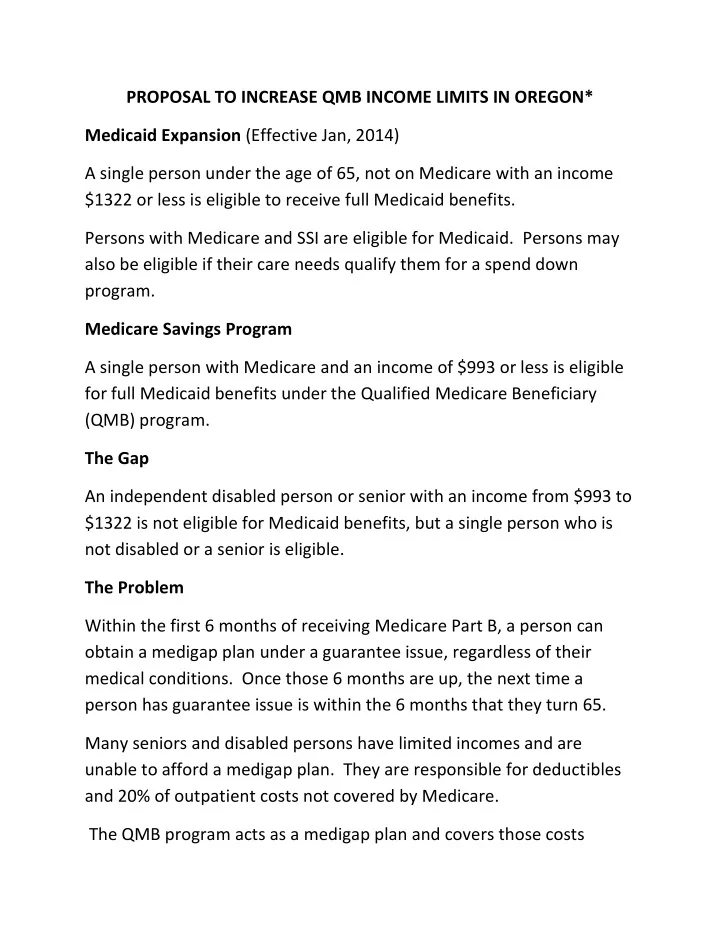

PROPOSAL TO INCREASE QMB INCOME LIMITS IN OREGON* Medicaid Expansion (Effective Jan, 2014) A single person under the age of 65, not on Medicare with an income $1322 or less is eligible to receive full Medicaid benefits. Persons with Medicare and SSI are eligible for Medicaid. Persons may also be eligible if their care needs qualify them for a spend down program. Medicare Savings Program A single person with Medicare and an income of $993 or less is eligible for full Medicaid benefits under the Qualified Medicare Beneficiary (QMB) program. The Gap An independent disabled person or senior with an income from $993 to $1322 is not eligible for Medicaid benefits, but a single person who is not disabled or a senior is eligible. The Problem Within the first 6 months of receiving Medicare Part B, a person can obtain a medigap plan under a guarantee issue, regardless of their medical conditions. Once those 6 months are up, the next time a person has guarantee issue is within the 6 months that they turn 65. Many seniors and disabled persons have limited incomes and are unable to afford a medigap plan. They are responsible for deductibles and 20% of outpatient costs not covered by Medicare. The QMB program acts as a medigap plan and covers those costs
The Proposed Solution Increase the QMB income limits to 138% of federal poverty limits, to match the guidelines set under the Medicaid Expansion. This would equalize the income limits that would enable a person to be eligible for Medicaid. Supporting Information The Federal Medicaid program specifies the minimum federal income and asset limits for the Medicare Savings Program, but states are permitted to make the eligibility criteria more generous. Many states use these limits, but Alaska (QMB limit is $1641), Connecticut (QMB limit is $2053), DC (QMB limit is $2728), Hawaii and Maine have higher limits. Several other states do not apply asset limits. *This information only talks about income limits for single persons. Income limits for couples are higher. Resource limits are also not represented here. Examples I am a Social Worker at two dialysis centers. My patients are a variety of ages and income levels. Many patients qualify for Medicare based on End Stage Renal Disease rules. I also have a number of patients that are above 65 and qualify for Medicare based on age. During the first 6 months a person becomes eligible for Medicare Part B, he/she may qualify for a medigap plan, regardless of medical conditions. They are not eligible for an advantage plan because of the renal disease. Those first 6 months can occur when a person first obtains Medicare Part B coverage or when they are eligible because of age at 65. In Oregon, a person also has guarantee issue if they lose Medicaid coverage.
In my mix of patients, I have some patients over the age of 65 who did not obtain a medigap plan when they first received Medicare. They will never be eligible for a medigap plan. The other group of patients are under the age of 65, and did not obtain a medigap plan when they received their Medicare coverage. This group will be eligible for a second period of guarantee issue when they turn 65. If any of these two groups qualify for a Medicare Savings Program, I encourage them to apply. Those that are eligible for QMB, will have their copays and deductibles paid, as though they had a medigap plan. Those that are eligible for SLMB* will only have their Medicare Part B premium paid and must still pay the 20% not covered by Medicare and hospital copays, etc. For example, I have one patient under the age of 65 who has Medicare and SLMB and no medigap plan. He is ineligible for a transplant because he does not have a medigap plan. He will not be eligible for a medigap plan until he turns 65. If the QMB limits were expanded to the $1322, he could be eligible for QMB and be accepted for a transplant. I have a number of patients who are older than 65, who have no medigap plan, and will never qualify, but could if the QMB income levels were expanded. Without expanding the QMB income limits to the same limit, my SLMB patients will have less medical coverage and much higher expenses than a newly eligible disabled person with a higher income. *SMLB is Medicare Savings Program that pays the Part B premium only. Astrid Perry, LCSW, Social Worker (July, 2014)
Recommend
More recommend